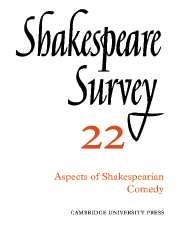Book contents
- Frontmatter
- Old and New Comedy
- An Approach to Shakespearian Comedy
- Shakespeare, Molière, and the Comedy of Ambiguity
- Comic Structure and Tonal Manipulation in Shakespeare and Some Modern Plays
- Laughing with the Audience: ‘The Two Gentlemen of Verona’ and the Popular Tradition
- Shakespearian and Jonsonian Comedy
- Two Magian Comedies: ‘The Tempest’ and ‘The Alchemist’
- ‘Thou that beget’st him that did thee beget’: Transformation in ‘Pericles’ and ‘The Winter’s Tale’
- The Words of Mercury
- Why Does it End Well? Helena, Bertram, and The Sonnets
- Some Dramatic Techniques in ‘The Winter’s Tale’
- Clemency, Will, and Just Cause in ‘Julius Caesar’
- Thomas Bull and other ‘English Instrumentalists’ in Denmark in the 1580s
- Shakespeare in the Early Sydney Theatre
- The Reason Why: The Royal Shakespeare Season 1968
- The Year's Contributions to Shakespearian Study 1 Critical Studies
- 2 Shakespeare’s Life, Times and Stage
- 3 Textual Studies
- Index
- Plate Section
‘Thou that beget’st him that did thee beget’: Transformation in ‘Pericles’ and ‘The Winter’s Tale’
Published online by Cambridge University Press: 28 March 2007
- Frontmatter
- Old and New Comedy
- An Approach to Shakespearian Comedy
- Shakespeare, Molière, and the Comedy of Ambiguity
- Comic Structure and Tonal Manipulation in Shakespeare and Some Modern Plays
- Laughing with the Audience: ‘The Two Gentlemen of Verona’ and the Popular Tradition
- Shakespearian and Jonsonian Comedy
- Two Magian Comedies: ‘The Tempest’ and ‘The Alchemist’
- ‘Thou that beget’st him that did thee beget’: Transformation in ‘Pericles’ and ‘The Winter’s Tale’
- The Words of Mercury
- Why Does it End Well? Helena, Bertram, and The Sonnets
- Some Dramatic Techniques in ‘The Winter’s Tale’
- Clemency, Will, and Just Cause in ‘Julius Caesar’
- Thomas Bull and other ‘English Instrumentalists’ in Denmark in the 1580s
- Shakespeare in the Early Sydney Theatre
- The Reason Why: The Royal Shakespeare Season 1968
- The Year's Contributions to Shakespearian Study 1 Critical Studies
- 2 Shakespeare’s Life, Times and Stage
- 3 Textual Studies
- Index
- Plate Section
Summary
In the climactic moments of the late romances, in Pericles and especially in The Winter’s Tale , a great part of the poetry is occupied in describing the principal people, praising them, doing them reverence, enhancing their meaning, while they present themselves, confront one another at gaze, or form a centre for the eyes of all beholders. This mode of presentation goes with the special sort of dramatic action which I want to outline in this paper, the transformation of persons into virtually sacred figures who yet remain persons. Before he knows that she is his daughter, Leontes says to Perdita and Florizel:
Oh, alas!
I lost a couple that ‘twixt heaven and earth
Might thus have stood begetting wonder as
You, gracious couple, do.
This might be a description of a moment of a court masque where some noble couple are presented in the roles of mythological deities; at court, the real identity of Proserpina and her consort would be known; the heaven and earth would be the work of Inigo Jones. One can think of more serious parallels in baroque religious painting, where the principals are highlighted in large space defined by streams of light connecting heaven and earth, while secondary figures gaze on them with wonder and awe. In The Winter’s Tale secondary figures come from the presence chamber to report to us the recognition of Perdita; some of their description might fit a painting by El Greco:
I make a broken delivery of the business, but the changes I perceived in the King and Camillo were the very notes of admiration. They seemed almost, with staring at one another, to tear the cases of their eyes. There was speech in their dumbness, language in their gesture; they looked as they had heard of a world ransomed, or one destroyed...There was casting up of eyes, holding up of hands…
- Type
- Chapter
- Information
- Shakespeare Survey , pp. 59 - 68Publisher: Cambridge University PressPrint publication year: 1970
- 2
- Cited by



